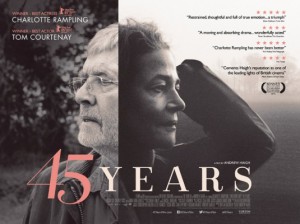Posts Tagged ‘Gabriel Byrne’
2015 Berlin Film Festival
2015 Berlin International
Film Festival Winners
The 65th annual Berlin International Film Festival was held from 5th to the 15th February, 2015
The Berlin International Film Festival known as the Berlinale takes places annually in February and is regarded as one of the most prestigious film festivals in the world.
The Opening Night film was Nobody Wants the Night directed by Isabel Coixet starring Juliette Binoche, Gabriel Byrne, Rinko Kikuchi and Matt Salinger.
Winners of the five main prizes at the 2015 Berlin Film Festival were as follows: –
Golden Bear (Best Film): Taxi directed by Jafar Panahi
Silver Bear (Best Director): shared between – Radu Jude for Aferim!
&
(No Poster Available for this film)
Best Actor: Tom Courtenay – 45 Years
Best Actress: Charlotte Rampling – 45 Years
Silver Bear for Best Script: Patricio Guzmán for The Pearl Button
Source: http://en.wikipedia.org/wiki/65th_Berlin_International_Film_Festival
2002 Toronto Film Festival
2002 Toronto International Film Festival Winners
Toronto International Film Festival (TIFF) takes place every year in September in Canada.
Films which premiere at Toronto are often nominated for Academy Awards the following year.
TIFF does not hand out individual prizes for Best Actor or Actress but focuses on amongst others the following awards:
People’s Choice Award & Best Canadian Feature Film
Opening Night Film: Ararat directed by Atom Egoyan, starring Charles Aznavour, Christopher Plummer, and David Alpay
People’s Choice Award: Whale Rider directed by Niki Caro, starring Keisha Castle-Hughes, Rawiri Paratene, Cliff Curtis and Vicky Haughton
Best Canadian Feature Film: Spider directed by David Cronenberg, starring Ralph Fiennes, Miranda Richardson & Gabriel Byrne
The Ultimate Social Climber
Vanity Fair
William Makepeace Thackeray is best known as the author of the seminal novel about British life during and following the Napoleonic Wars in the wonderfully descriptive, incisive and popular novel Vanity Fair. Published in 1877, the novel remains as relevant today with language and style which is as accessible in the early 21st century as it originally was in the 19th century. Vanity Fair was not a Dickens or an Eliot novel, all social realism and stark morals but light, sharp and ironic with Thackeray weaving a vast plot with a huge collection of characters with flair and dexterity always keeping the reader in his sardonic sights, whilst remaining poignant, acerbic and darkly entertaining.
Vanity Fair follows the fortunes of Becky Sharp, the heroine a governess who becomes an artful social climber and marries into the wealthy Crawley family, illustrating how unscrupulous and brilliantly wicked and willful a heroine can be. The novel is episodic by nature and weaves many tales surrounding Becky’s rise and fall and rise again in the colourful and notorious Regency period in England, when as a nation, the British were establishing themselves as an Imperial power to be reckoned with.
Renowned Indian film director Mira Nair who brought the colourful and joyous Monsoon Wedding to international cinema, was at the helm of the film version of Vanity Fair, featuring the surprising but clever casting of American sweetheart actress and star of Legally Blonde and Cruel Intentions, Reese Witherspoon as Becky Sharp supported by a vast sea of British actors from Oscar Winner Jim Broadbent to Jonathan Rhys-Meyers of The Tudors fame to a lesser known Robert Pattinson, now famous as Edward Cullen in the Twilight Saga.
Whilst novel and film are two entirely different mediums both can be appreciated the first being a great social commentary of the emerging British Empire and the film as a sparkling and lavish period tale with exotic settings from Belgium and Bath to Baden-Baden ending with a vibrant colourful elephant ride in India.
Rereading Thackeray’s Vanity Fair certainly reveals how little has changed in high society over the centuries with nations still as obsessed with wealth, pride, status and ambition while stronger individuals take advantage of the weak for the benefit of securing more power and fame.










